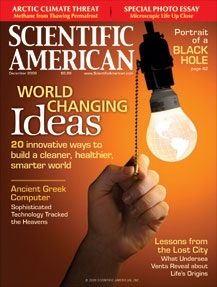Due to circumstances beyond my control, I was unable to update Future Conscience on Friday with our link roundup. So I’m going to rectify the situation with today’s update. It might be a bit late, but here’s last week’s Link Roundup!
As our Site of the Week last week was the Scientific American website, the link roundup will be focusing upon recent scientific advancements and progress. Rather than pointing to articles that are very conceptual or too hypothetical, I wanted to highlight some recent studies and events that point to solid findings or breakthroughs.
With that said, here’s a quick look at five science stories that have been making the rounds recently:
1) Can we improve upon paper? – the first link is fittingly from the Scientific American website and looks at a possible way to improve the most ubiquitous of inventions – paper – into a battery.
2) New planets found near Sun-like stars – Four new planets have been discovered near two different Sun-like stars, leading to further research on possible future habitable planets.
3) Nanosensors used to measure cancer biomarkers – building on previous research, a team at Yale University has unveiled the first use of nanowire sensors to detect for signs of cancer.
4) Aids research suffers setback – human trials of an HIV blocking gel have proven to be unsuccessful and a big setback as there were early indications that it may have been successful.
5) Large Hadron Collider claims energy record – as it builds up to the main event the Large Hadron Collider has smashed through previous energy creation records, and this is only the beginning.
Obviously, these five links are but a minute part of the large amount of varied scientific research being done and published on a daily basis around the globe. Now, more than ever, science is progressing in leaps and bounds and exploring possibilities that were just a few decades ago not even imagined. It’s an exciting time to keep up with the world of scientific research and if you aren’t doing so already now is the time to start.
If you have come across any other recent scientific publications or news stories that you find particularly interesting, please let us know in the comments!
[ad name=”Google Adsense-Link Banner x4″]

